#meanwhile heterosexual couples are a “missed opportunity”
Text
I don't want to be that person, but Jack/The Doctor is probably one of the most underrated ships ever.
And I mean that in the sense that The Doctor regularly professes how lonely it is to be a timelord, how "humans wither and die", how they can't get too attached to them because it would only lead to pain and heartbreak. Well, guess who's immortal...
They constantly destroy themself every time something bad happens to a companion. In the fourth season, he nearly lost his mind because of it and refused to take a new companion. Well, guess who can't die...
Not to mention how deep their trust issues run and how they have problems opening up to people. Well, guess who spent a whole-ass motherfucking YEAR in an intergalactic, highly guarded prison, probably the most secure in the entire universe, to get the Doctor out. Jack didn't even spare a thought about it. He immediately ran the moment he heard she needed help.
One more thing that's a recurring concern for the Doctor is how well a new companion might accept and get used to their new face after a regeneration (think Rose at the start of s2). So far, we've seen Jack not blink an eye with three different regenerations. No. It's more than that. Jack was not only entirely unfazed, but he fell utterly and deeply in love with each and every one of them.
Also, not to mention the shared trauma from their time together on the Valiant (shared trauma wohoo). As well as the fact that Jack is smart, experienced, quick, strong, understands technology and science, overall a perfect companion to travel the stars with.
And last but not least, Jack is completely unquestionably, unequivocally, and madly IN LOVE with them. Loyalty, respect, adoration, affection, attraction, reverence, love. He feels all of it.
It all just FITS. I genuinely and wholeheartedly agree that the Doctor would have been happier if they hadn't left him at the end of s1.
#people always talk about how the doctor was cold towards martha#but no one ever talks about how dismissive he was towards jack#perhaps because were conditionally taught that male attraction always must end in dissapointment#meanwhile heterosexual couples are a “missed opportunity”#a bit of homophobia#nevermind how internalised it is#(also i know the doctor is technically not cis or straight but you get my point)#doctor who#doctorwho#the doctor#jack harkness#captain jack harkness#the doctor x jack harkness#dw#nuwho#newwho#torchwood
123 notes
·
View notes
Text
how black lightning is treating its wlw romance
(just for context's sake, i'm currently watching 3x04 of black lightning)
(SPOILERS FROM SEASON 2)
i love black lightning. it is a series about a black family of superheroes and that is the main reason why i started to watch it. the black representation is amazing, just like the way they address the struggles of black people in the usa. i also love seeing black girls (with dark skin!) on screen with different hairstyles.
one of the things i love the most about black lightning is the main family. i'm so here for the family issues, not only metahuman related, but also the day to day stuff. the series addresses parental control, coming of age, leadership, the subversion of gender roles (lynn stewart? yes ma'am), dialogue, responsibility, respect, boundaries and, on top of that, the love the pierces have for each other.
besides, i can see myself on anissa and jennifer, not only because of their relationship with their parents but also in the way they interact with each other. every time they get to talk about anything, like school, race, gender, periods (!!!!), sex, clothes, their parents and, sure, even superpowers, i can't help but smile because it's so goddamn beautiful. their sisterhood is definitely one of the things that attached me to black lightning from the start. but i'm getting distracted here.
that said, i have to share one thing i do not like about the series. the way it handles its lgbt characters aka anissa and grace (mostly grace) (and i'm not even mentioning the other 3). just to point out, i didn't start watching the show because of them, if i did i probably would have already abandoned it by now. yeah, i'm mad about grace's almost nonexistent screen time. sis shows up one episode for one scene and a half and then vanishes for another three episodes. the majority of the interactions between her and anissa happen off-screen. how do i know that? i had to ASSUME that in order to make sense of their relationship. the first few times we get to see grace it seems like she and anissa are good friends. next season, when she comes back after a very long time, it looks like anissa ghosted her and is cheating on her???? and i didn't even know they were together or something??? every time i see them on screen it feels like they are on a completely different page comparing with how they were last time i saw them. at first, i thought i was missing something... until i realized it was the show that was LACKING content.
just to make it clear, i never expected the show to be about them. it is supposed to be focused on, well, black lightning. i was ok with that. i even ignored this feeling that something was wrong... and then i noticed how much screen time khalil has. i can't help but compare him with grace because both of them are romantically involved with our pierce girls and both of them have powers. even though they have those characteristics in common, it is pretty obvious that grace doesn't get as much attention as khalil does. and it pisses me off. there's also the fact that i'm not very fond of teen romance, but that's just a personal taste and i'm not going to elaborate on that while it seems like the writers keep forgetting about grace's existence, they do not forget about khalil. even after his death.
i like khalil. he is a well written, charismatic character. i find his interactions with jennifer very tender and it is very cute to see how much they care about each other. we get to know khalil's dreams, his pain, his confusion, his anger, his guilt and, finally, his redemption. his arc was so carefully done. i don't like the resurrection thing, though, but that's another story...
and then we have grace, whose life we barely know until she disappears without telling anissa a thing. while she is missing, the audience receives a lot of important information like: she was a foster kid, she was kidnapped by a prostitution ring at the age of 16 (???), grace choi is an alias and she is, in fact, a metahuman. a shapeshifter, to be more specific. and all that during her absence! i mean, she wasn’t given the opportunity to tell it by herself!!!! meanwhile, khalil manages to come back from dead before grace's return!!! and he has a lot of very long, graphic scenes!!! i mean, c'mon. i couldn't care less about the 23 martial arts he knows, and i definitely don't give a f*ck about his punch-on-the-heart thing.
not only grace is belittled as a character, her relationship with anissa has been almost insignificant to the story. jennifer and khalil had it all: cute scenes on the roof, khalil asking jennifer to be his girlfriend, sex talk, supportive moments, the drama, reconciliation, they run away together and then jen has a lot of scenes showing her coping with his loss. all we have from thunder grace is a few cute dialogues and other few kinda-arguments (which sound out of place if you watch them isolated because you have no clue regarding what happened off-screen), then we’re shown grace is hiding something, she leaves, anissa talks to gambi and jennifer about her and that’s it. WHERE IS MY DRAMA???? i don’t wanna see khalil’s muscles for the 8464th time, i just want anissa and grace to talk properly!
i love the representation in black lightning. i love watching a black family full of strong women being cute with each other and at the same time changing their community for the better. but then we have this asian bisexual woman who doesn't even have room to grow as a character, being constantly put aside. and this is not me saying that she should appear more just because she is a queer woman of color. my point is that she is a very interesting character, with a troubled past and a possibly nice personality. AND SHE IS A METAHUMAN, AN EFFING LEOPARD, what could be more related to the plot than that??? the way i see it, the story that is being told in the show would make more sense if she had more space, if she was actually part of it and not only an afterthought. she could add so much more to the plot. but it takes the writers being interested enough to put some effort on it, which they clearly don't have. by the time grace didn't even show up on season 2's finale, i felt disrespected by this lack of interest, as a bisexual woc myself and as a huge shipper of thundergrace. jennifer and khalil's teen heterosexual romance was at the center of the last episodes, meanwhile grace was mentioned a couple of times and that was it. why can't she get the same attention the other side characters do? some of them are so useless to the plot and yet there they are. am i talking about lala? idk.
grace could be so much more, she deserved more dialogues, an entire arc, actually being part of the plot. she deserved more complexity. i know grace has the potential. it is a shame that the show slept on her like that. i don’t want lgbt representation for representation’s sake, i want it for real.
#black lightning#grace choi#anissa pierce#thundergrace#lgbt#khalil payne#painkiller#jennifer x khalil#anissa x grace#representation
53 notes
·
View notes
Text
BECAUSE THE CORONAVIRUS IS JUST HURTING FEMINIST AND ONLY FEMINISTS AND ABSOLUTELY NO ONE ELSE...
..........
Enough already. When people try to be cheerful about social distancing and working from home, noting that William Shakespeare and Isaac Newton did some of their best work while England was ravaged by the plague, there is an obvious response: Neither of them had child-care responsibilities.
Shakespeare spent most of his career in London, where the theaters were, while his family lived in Stratford-upon-Avon. During the plague of 1606, the playwright was lucky to be spared from the epidemic—his landlady died at the height of the outbreak—and his wife and two adult daughters stayed safely in the Warwickshire countryside. Newton, meanwhile, never married or had children. He saw out the Great Plague of 1665–6 on his family’s estate in the east of England, and spent most of his adult life as a fellow at Cambridge University, where his meals and housekeeping were provided by the college.
For those with caring responsibilities, an infectious-disease outbreak is unlikely to give them time to write King Lear or develop a theory of optics. A pandemic magnifies all existing inequalities (even as politicians insist this is not the time to talk about anything other than the immediate crisis). Working from home in a white-collar job is easier; employees with salaries and benefits will be better protected; self-isolation is less taxing in a spacious house than a cramped apartment. But one of the most striking effects of the coronavirus will be to send many couples back to the 1950s.
Across the world, women’s independence will be a silent victim of the pandemic.
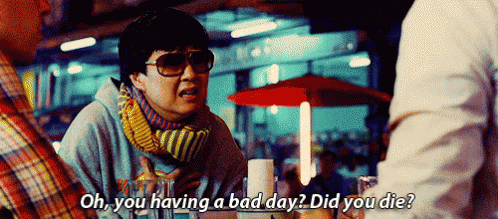

Purely as a physical illness, the coronavirus appears to affect women less severely. But in the past few days, the conversation about the pandemic has broadened: We are not just living through a public-health crisis, but an economic one. As much of normal life is suspended for three months or more, job losses are inevitable. At the same time, school closures and household isolation are moving the work of caring for children from the paid economy—nurseries, schools, babysitters—to the unpaid one. The coronavirus smashes up the bargain that so many dual-earner couples have made in the developed world: We can both work, because someone else is looking after our children. Instead, couples will have to decide which one of them takes the hit.
Many stories of arrogance are related to this pandemic. Among the most exasperating is the West’s failure to learn from history: the Ebola crisis in three African countries in 2014; Zika in 2015–6; and recent outbreaks of SARS, swine flu, and bird flu. Academics who studied these episodes found that they had deep, long-lasting effects on gender equality. “Everybody’s income was affected by the Ebola outbreak in West Africa,” Julia Smith, a health-policy researcher at Simon Fraser University, told The New York Times this month, but “men’s income returned to what they had made pre-outbreak faster than women’s income.” The distorting effects of an epidemic can last for years, Clare Wenham, an assistant professor of global-health policy at the London School of Economics, told me. “We also saw declining rates of childhood vaccination [during Ebola].” Later, when these children contracted preventable diseases, their mothers had to take time off work.
At an individual level, the choices of many couples over the next few months will make perfect economic sense. What do pandemic patients need? Looking after. What do self-isolating older people need? Looking after. What do children kept home from school need? Looking after. All this looking after—this unpaid caring labor—will fall more heavily on women, because of the existing structure of the workforce. “It’s not just about social norms of women performing care roles; it’s also about practicalities,” Wenham added. “Who is paid less? Who has the flexibility?”
According to the British government’s figures, 40 percent of employed women work part-time, compared with only 13 percent of men. In heterosexual relationships, women are more likely to be the lower earners, meaning their jobs are considered a lower priority when disruptions come along. And this particular disruption could last months, rather than weeks. Some women’s lifetime earnings will never recover. With the schools closed, many fathers will undoubtedly step up, but that won’t be universal.
Despite the mass entry of women into the workforce during the 20th century, the phenomenon of the “second shift” still exists. Across the world, women—including those with jobs—do more housework and have less leisure time than their male partners. Even memes about panic-buying acknowledge that household tasks such as food shopping are primarily shouldered by women. “I’m not afraid of COVID-19 but what is scary, is the lack of common sense people have,” reads one of the most popular tweets about the coronavirus crisis. “I’m scared for people who actually need to go to the store & feed their fams but Susan and Karen stocked up for 30 years.” The joke only works because “Susan” and “Karen”—stand-in names for suburban moms—are understood to be responsible for household management, rather than, say, Mike and Steve.
Look around and you can see couples already making tough decisions on how to divide up this extra unpaid labor. When I called Wenham, she was self-isolating with two small children; she and her husband were alternating between two-hour shifts of child care and paid work. That is one solution; for others, the division will run along older lines. Dual-income couples might suddenly find themselves living like their grandparents, one homemaker and one breadwinner. “My spouse is a physician in the emergency dept, and is actively treating #coronavirus patients. We just made the difficult decision for him to isolate & move into our garage apartment for the foreseeable future as he continues to treat patients,” wrote the Emory University epidemiologist Rachel Patzer, who has a three-week-old baby and two young children. “As I attempt to home school my kids (alone) with a new baby who screams if she isn’t held, I am worried about the health of my spouse and my family.”
Single parents face even harder decisions: While schools are closed, how do they juggle earning and caring? No one should be nostalgic for the “1950s ideal” of Dad returning to a freshly baked dinner and freshly washed children, when so many families were excluded from it, even then. And in Britain today, a quarter of families are headed by a single parent, more than 90 percent of whom are women. Closed schools make their life even harder.
Other lessons from the Ebola epidemic were just as stark—and similar, if perhaps smaller, effects will be seen during this crisis in the developed world. School closures affected girls’ life chances, because many dropped out of education. (A rise in teenage-pregnancy rates exacerbated this trend.) Domestic and sexual violence rose. And more women died in childbirth because resources were diverted elsewhere. “There’s a distortion of health systems, everything goes towards the outbreak,” said Wenham, who traveled to west Africa as a researcher during the Ebola crisis. “Things that aren’t priorities get canceled. That can have an effect on maternal mortality, or access to contraception.” The United States already has appalling statistics in this area compared with other rich countries, and black women there are twice as likely to die in childbirth as white women.
For Wenham, the most striking statistic from Sierra Leone, one of the countries worst affected by Ebola, was that from 2013 to 2016, during the outbreak, more women died of obstetric complications than the infectious disease itself. But these deaths, like the unnoticed caring labor on which the modern economy runs, attract less attention than the immediate problems generated by an epidemic. These deaths are taken for granted. In her book Invisible Women, Caroline Criado Perez notes that 29 million papers were published in more than 15,000 peer-reviewed titles around the time of the Zika and Ebola epidemics, but less than 1 percent explored the gendered impact of the outbreaks. Wenham has found no gender analysis of the coronavirus outbreak so far; she and two co-authors have stepped into the gap to research the issue.
The evidence we do have from the Ebola and Zika outbreaks should inform the current response. In both rich and poor countries, campaigners expect domestic-violence rates to rise during lockdown periods. Stress, alcohol consumption, and financial difficulties are all considered triggers for violence in the home, and the quarantine measures being imposed around the world will increase all three. The British charity Women’s Aid said in a statement that it was “concerned that social distancing and self-isolation will be used as a tool of coercive and controlling behaviour by perpetrators, and will shut down routes to safety and support.”
Researchers, including those I spoke with, are frustrated that findings like this have not made it through to policy makers, who still adopt a gender-neutral approach to pandemics. They also worry that opportunities to collect high-quality data which will be useful for the future are being missed. For example, we have little information on how viruses similar to the coronavirus affect pregnant women—hence the conflicting advice during the current crisis—or, according to Susannah Hares, a senior policy fellow at the Center for Global Development, sufficient data to build a model for when schools should reopen.
We shouldn’t make that mistake again. Grim as it is to imagine now, further epidemics are inevitable, and the temptation to argue that gender is a side issue, a distraction from the real crisis, must be resisted. What we do now will affect the lives of millions of women and girls in future outbreaks.
The coronavirus crisis will be global and long-lasting, economic as well as medical. However, it also offers an opportunity. This could be the first outbreak where gender and sex differences are recorded, and taken into account by researchers and policy makers. For too long, politicians have assumed that child care and elderly care can be “soaked up” by private citizens—mostly women—effectively providing a huge subsidy to the paid economy. This pandemic should remind us of the true scale of that distortion.
Wenham supports emergency child-care provision, economic security for small-business owners, and a financial stimulus paid directly to families. But she isn’t hopeful, because her experience suggests that governments are too short-termist and reactive. “Everything that's happened has been predicted, right?” she told me. “As a collective academic group, we knew there would be an outbreak that came out of China, that shows you how globalization spreads disease, that’s going to paralyze financial systems, and there was no pot of money ready to go, no governance plan … We knew all this, and they didn't listen. So why would they listen to something about women?”
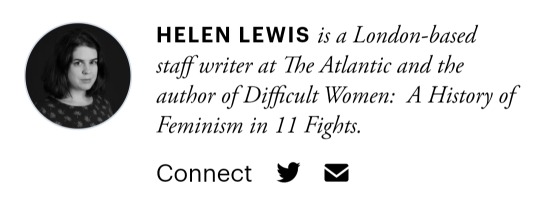
Remember this article the next time a politician brings up the draft again...
because I remember the last reaction.
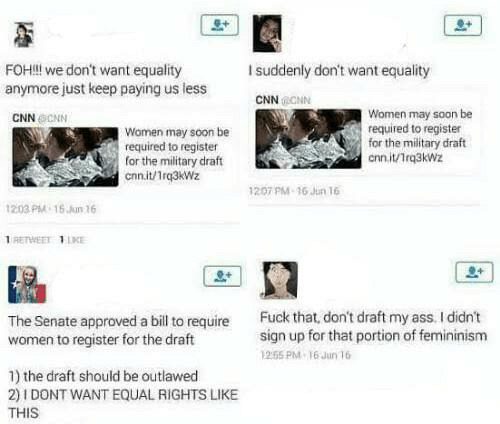
197 notes
·
View notes
Text
199. Sonic the Hedgehog #131

Deep breaths, guys. I know what the cover page says. I know. We'll get to that. Just hang in there. I think you might like what I have in store.
Home (Part 2 of 4): The Gathering
Writer: Karl Bollers
Pencils: Ron Lim
Colors: Jason Jensen
So not much actually happens in this installment of Home other than the various characters talking to each other about and preparing for the upcoming battle. Since Sonic has been gone, a new Freedom Fighter Special has been constructed that can cut travel time dramatically around the globe. A journey that in the Tornado or on foot (in Sonic's case) would have taken up to two hours can be completed in a mere half hour now, thanks to Rotor's engineering prowess. And thus, Sonic and Tails head out to Old Megaopolis to stop Eggman's twin nukes from launching, along with an… interesting backup team, to say the least.
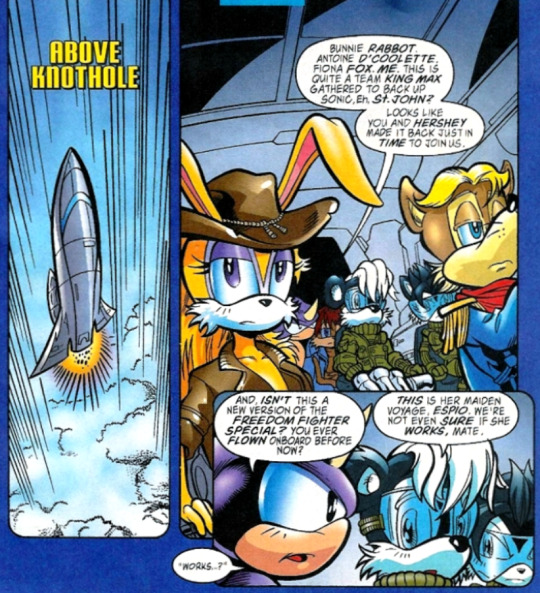
Man, remember Fiona? It's been ages since we've seen her! It appears that while Sonic was in space, she joined up with the crew in Knothole and has been helping them fight Eggman. That's definitely a better life for her than to be running with the likes of Nic the Weasel, eh? Meanwhile, Knuckles, Julie-Su, Amy Rose, and the other two (active) members of the Chaotix head to Fort Acorn, where General D'Coolette is giving a speech to the soldiers under his command. We've never even heard of this fort before, but according to the general it's been here for ten years, keeping a forward watch on Robotropolis, and this watch has been maintained even after Robotropolis' destruction in case of just such a situation as the current one. With their reinforcements from Knothole, the crew at the fort prepare to defend the city against a massive swatbot assault to lower the forcefield keeping the radiation in check. Back in Knothole, extra measures are being taken to make absolutely sure that even if the worst happens, the citizenry will be safe.
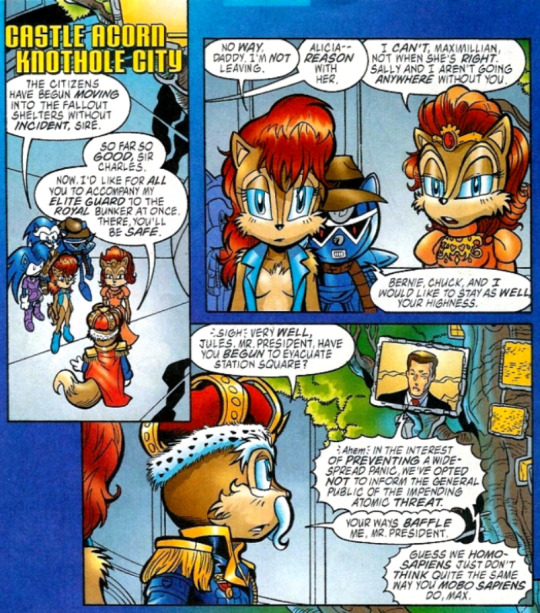
Station Square, for their part, has sent a squad of GUN commandos to help in the battle at Old Megaopolis. The commander of the military is baffled by this decision, wanting to send in their full fighting force, but the president instead opts to trust his allies from Knothole - though just for insurance, he's sent one of his own operatives along for the ride…
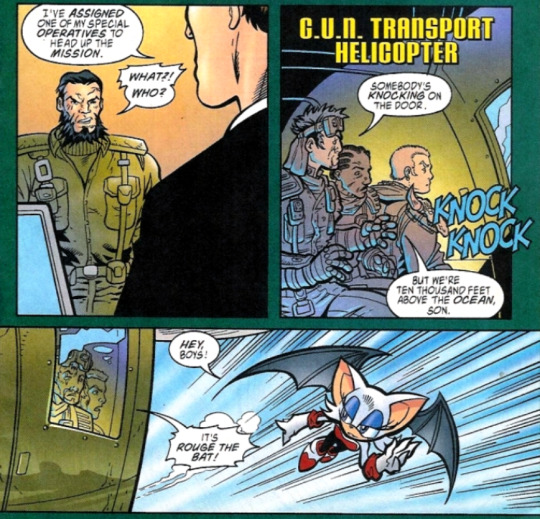
Now that's what I like to see! It's about time Rouge got herself some proper screentime. As all this is going on, Eggman waits aboard a docked battleship in the harbor of Old Megaopolis with his assistant M, and orders A.D.A.M. to begin the missile countdown. However, almost immediately, the sound of a biplane puts them on high alert, and Eggman is shocked to see Sonic and Tails bearing down on his location, not having expected them to be able to get here nearly so fast. See, Eggman, this is why you resist the siren call of your ego and keep your damn plans to yourself. All you did was give your enemies ample warning to prepare to foil your evil plot, you idiot!
Mobius 25 Years Later: Prologue
Writer: Ken Penders
Pencils: Steven Butler
Colors: Jensen
Okay, guys. This is it. We've reached the most Penders thing of all time. This is something that has been hinted at here and there from all the way back in the Sonic In Your Face special to now, and we're finally seeing the culmination of all of that buildup. All the intricate worldbuilding, all the complex character arcs, all the intrigue and political spider webs and back to back wars and everything that the world of Mobius has been through up until now - there's so much to explore, so many directions it could have gone. We're about to see what this world might look like twenty-five years into the future, and with so much rich history to draw from, what might you imagine this story might look like? What genre might it fall into? Well wonder no longer!
It's a drama. It's a teen drama.
There's a reason that Mobius 25 Years Later is widely considered to be one of the worst parts of the comic. The tone of it is just so far off anything else we've experienced so far that it clashes horribly with what we've come to expect. It's not some masterful subversion of expectations or something - in a lot of ways I consider it to be a genuine insult to the rest of the preboot's material up to this point. It's painfully and immediately clear that this is a story Penders has wanted to tell for a while, but, not being able to fit his "middle-aged adults adulting everywhere and being so adult-like while ignoring the feelings and difficulties that ordinary teenagers face" plot anywhere into the rest of the comic, he's opted to just fire the world a couple decades into the future, pair all the major characters off into weird and oftentimes arbitrary heterosexual marriages, give everyone 2.5 children and a titanium picket fence, and then throw in some allusions to the old "war against Doc 'Botnik" here and there lest we forget, entirely understandably at this point, that we're reading a Sonic the Hedgehog comic here. This thing goes on for nineteen whole issues, taking up each subsequent issue's backup story, and ultimately has no real impact on the actual story involving the characters we already know and love. However, this is technically canon, or at least a version of canon (as when you play with alternate realities and multiple timelines, futures are bound to get mixed up here and there), so we're gonna be covering it - all of it. I wouldn't be tempted to skip it anyway, as by delving into each chapter in this trainwreck, we can actually explore why this whole thing fails so hard, and why it's therefore so loathed in the fandom. Plus, I do recognize that some people actually do enjoy this arc for various reasons (one of my close friends does, and has a whole AU of her own relating to it in fact), so I do plan to at least try to be fair in my review - but I really can't hide that I find this whole affair boring as hell, often downright offensive, and ultimately completely out of place. With all that in mind, let's dive in!
We begin with a full page of exposition delivered to us via high school lecture, because everyone knows the best way to establish your worldbuilding is by infodumping it directly into your audience's eyeballs. Apparently, over the last twenty years, Angel Island has been heavily developed into its own independent republic, with a new city, Portal, acting as the center of trade between the island and the mainland below. We're once again introduced to Lara-Su, who, instead of being the badass time-traveling young adult whom we followed before, is now an ordinary teenager taking ordinary high school classes among a bunch of ordinary high school echidnas.
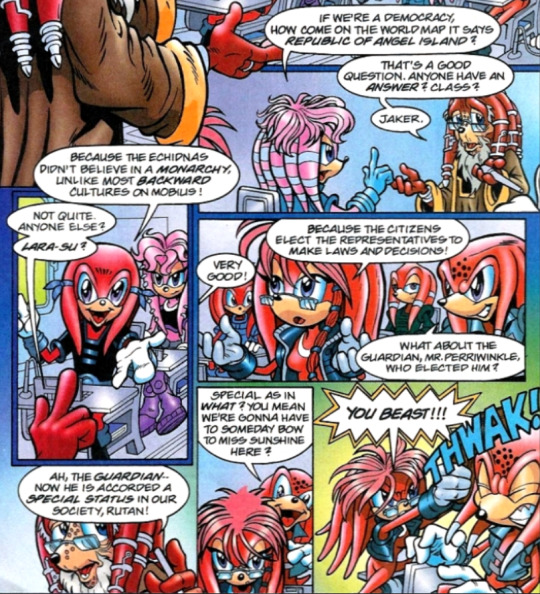
One of the biggest failings of this story is that Penders writes every teenage character how he thinks teenagers act, from his point of view as a middle-aged adult. This becomes abundantly clear the longer you read, as every teenager is a hormone-fueled, authority-defying, entitled, whiny, fickle child who just doesn't understand how the real world works, while every adult is a wise, experienced, and highly logical individual who always knows more than their younger fellows and refuses to pay attention to the whims of mere children. Like, I'm not even exaggerating here - I'm going to be pointing out every instance of this kind of behavior over the entire rest of this arc, and you can't stop me, so nyah nyah. Penders shows so little respect for the mere concept of teenagers, which is a terrible attitude to have not just in general, but especially if you're one of the head writers for an entire series about teenagers saving the goddamn world! Anyway, case in point: the teacher, instead of admonishing Rutan for being a bully, merely snaps at Lara-Su for not acting enough like a "young lady" and tells her to stay after class. Ugh.
Later that day, Rotor arrives on Angel Island as a liaison for the royal ruling couple, Queen Sally and King Sonic, because yes, Sonic literally becomes king in this timeline. He catches a ride from Harry - hey, good to see our favorite dingo still doing well for himself at least - and meets with Espio, who is now apparently Knuckles' secretary or something. At least, that's all I can assume from this weird-ass conversation.
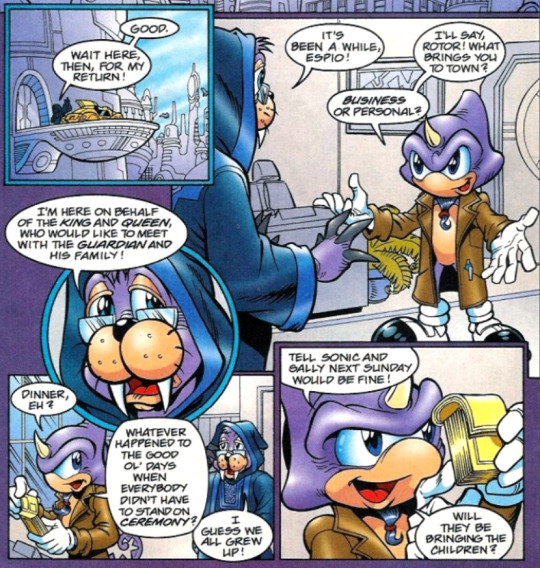
As a matter of fact, yes, Sonic and Sally are bringing their two children, Sonia and Manik, to the family dinner! How very mid-70s domestic family unit of them! Espio informs Knuckles of this over a television screen as the latter broods around in some kind of high-tech facility. Unlike what we've seen of Espio, the years have dramatically changed Knuckles' appearance - his right eye is missing, replaced with a mechanical one, and he sports the cowboy hat that Hawking gave him in the past (you know, the one we never saw again after he received it). While I actually quite like the idea of a main character in the comic losing something as important as an eye, I feel like there's a huge missed opportunity here - instead of just thrusting us into an alternate future where everything is fine but one character is inexplicably missing an eye, how about actually showing us the story of how that eye was lost? Show us a Knuckles who's learning to cope with the loss of an important body part, and having to adjust to his mechanical prosthetic! Go into his feelings about the subject, as someone who has so long been opposed to a faction that thrives on mechanical prosthetics, instead of just skipping over what has the potential to be the most interesting part of this story! Ugh, sorry, there's just nothing that gets to me more than a missed opportunity like this. Knuckles and Espio exchange some tortured small-talk about their kids for a little while, with the only interesting part of the conversation being their discussion of Rotor's arrival and how he's likely here to see someone named Cobar, with whom he apparently has a history. More on that later. Knuckles excuses himself from the conversation, as he has to be home in time for his daughter's "Unveiling" tonight, and as the call ends we zoom out to see that apparently nowadays, the Master Emerald is hooked up to all sorts of technology in this facility, presumably maintaining everything automatically. However, this story isn't done throwing weird curveballs at us yet - it's time to see what our former villains are up to in this future!
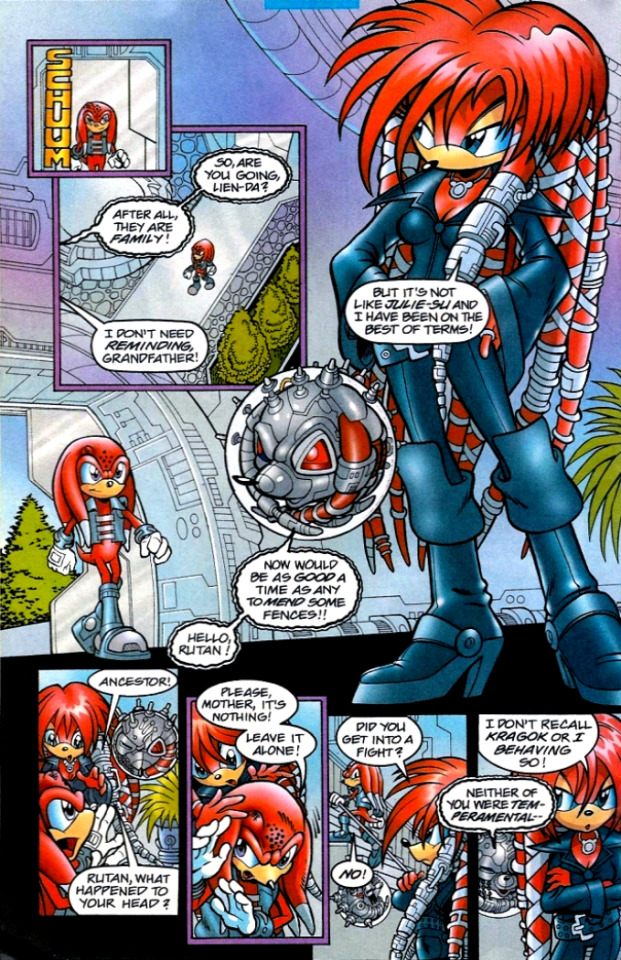
There is so much to unpack here. Dimitri, feared overlord of the Dark Legion, is now an amiable cyborg-head-in-a-bubble. Lien-Da, the treacherous second-in-command who regularly spoke of betraying Dimitri and taking the Legion in her own darker direction, is now apparently a single mom who's embraced the domestic life, taking care of her rowdy teenage son while, predictably, complaining about the behavior of kids these days. And weirdest of all, apparently everyone is just fine with these literal former terrorists living in their midst and doing ordinary mom and grandpa things, with Lien-Da even apparently amenable to the idea of trying to make up with Julie-Su because "they're family," despite her history of, you know, erasing Julie-Su's memory multiple times and killing her biological parents as revenge for her birth. I mean, is this what Penders thinks adulthood is? Is he even entirely sane? Does he know the definition of terrorism?
Any-goddamn-way, Knuckles arrives home to his eerily sterile-looking steel-plated mansion that looks more like the lobby of a pharmaceutical laboratory than a place where people live, and greets his loving housewife Julie-Su, who's gained a cute giant ponytail but lost absolutely everything else that made her unique, including her own cybernetic parts and just her personality in general. She informs Knuckles that Lara-Su has locked herself in the bathroom and is having herself a mighty tantrum, refusing to come out to get ready for her Unveiling ceremony, which is apparently the equivalent of a Quinceañera for echidna girls. Knuckles, instead of doing something reasonable like asking her why she's upset, starts aggressively demanding that she come out of her room this instant, while Lara-Su repeatedly yells about how she doesn't wanna. Ugh, teenagers, amiright?
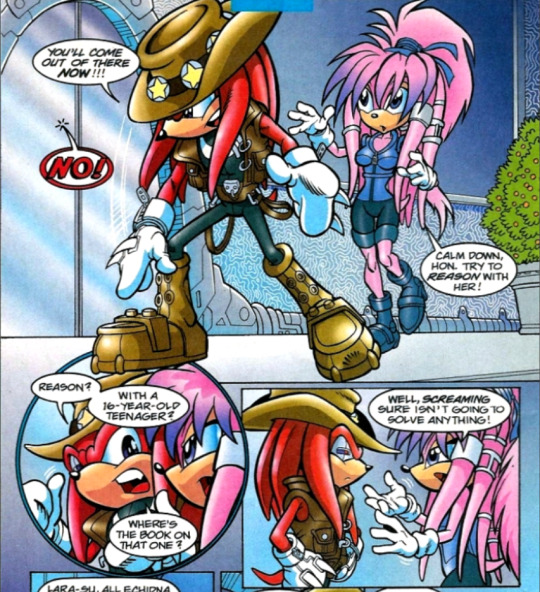
Seriously, I just can't get over how little respect Penders has for teenagers in his writing. Like, yes, I acknowledge that teenagers aren't always the most logical of beings, but they're also not goddamn three-year-olds either. They're old enough to articulate their desires and express their unique opinions, and often do so in very mature ways, especially if they're raised well and treated with the same respect you'd afford any adult. I should know, I was one myself. I would have assumed Penders was one as well at some point, but perhaps he just popped into the world one day as a fully-formed 43-year-old, full of disdain for those younger than himself. It would certainly explain everything we're seeing here.
Anyway, it turns out that the reason Lara-Su is upset is because Knuckles refuses to train her to be a Guardian, and so she whines and yells about it from behind the door like a petulant child as Knuckles continually refuses to actually give her a solid reason why he won't let her be one. When Julie-Su basically forces him to calm the hell down and explain himself, he reluctantly explains that since all the duties of a Guardian have by now been taken over by other functions of their society, he feels there's no longer any need for one, himself included. This is apparently enough to make Lara-Su immediately happy enough to burst out of the bathroom and grab her father's arm, suddenly totally excited to go to her Unveiling as long as Knuckles promises her the first dance. Ah, the fickle mind of a silly, silly teenager!
Kill me.
#nala reads archie sonic preboot#archie sonic#archie sonic preboot#sonic the hedgehog#sth 131#writer: karl bollers#writer: ken penders#pencils: ron lim#pencils: steven butler#colors: jason jensen
1 note
·
View note
Text

hi everyone! i’m jay (24, est, she / her) and i’m so excited to be here! this is chloe, my social media obsessed darling who’s faker than a three dollar bill but a good person at heart. underneath the cut is an obnoxiously long intro. i’ll be around tonight to plot, and i’ve got a three day weekend so i’m super pumped to get some good connections going and get active on the dash :)))
BASICS
full name: chloe ann lautsch
age: twenty-one
birthday & star sign: february 6th, aquarius
birthplace: festus, missouri
sexuality: heterosexual
gender identity & pronouns: cis female, she / her
housing: audax
occupation: social media influencer
+ traits: progressive, business-savvy, independent, imaginative, go-getting, determined, kind-hearted, take-charge
- traits: inauthentic, dishonest, ashamed of her past, perfectionist, performative, untruthful, closed-off
song: sampaguita by navvi
BACKGROUND
— chloe was born in missouri to a mother that was pretty much useless as a parent. her mother, deb, was a bar fly who would go home with almost any man who’d so much as buy her a drink. she inevitably ended up pregnant with chloe, but was woefully unprepared for motherhood. this led to chloe growing up without much structure, forced to be independent. the home was dysfunctional, as the only thing worse than deb’s parenting skills was her taste in men. chloe often found herself having to bandage up her mother’s wounds or with wounds of her own after drunken altercations.
— all things considered, chloe did well in school. though socially, she struggled. it was hard making friends when she couldn’t invite them over without fear they’d walk in and find her mother passed out on the couch. or when people made fun of her due to rumors about her mother. chloe never had much money or nice things in general. and though this made it harder to fit in, it also instilled a fiery work ethic in her. by sixteen she was working two jobs, trying to study for her algebra tests while manning a mcdonald’s drive through or babysitting local kids.
— with everything going on in her life, chloe barely had time to breathe, let alone eat or sleep. with exhaustion taking its toll and SATs coming up, she began buying adderall to help her get through long days and nights. later, her mother began dating a scummy dealer and chloe would steal from his stash, developing a cocaine habit. but chloe was always good at making herself and her life look like something it wasn’t. she mostly did it on social media, after finally saving up enough to buy an iphone.
— at age seventeen, chloe petitioned for early graduation. and with her teachers basically clamouring over themselves to write her letters of recommendation, she was set for college. however, she had no idea what she wanted to do. her instagram had developed a surprisingly decent following for a girl from bumfuck missouri, mostly due to her seemingly “perfect” life. she loved the internet. her instagram followers didn’t know that she lived in a trailer or that her mom was a falling-down drunk. unlike her small town where reputation preceded people, on the internet, people only knew what she wanted them to know. she could make her life be anything. she could reinvent herself. so she’d put together cute outfits, not letting her followers know everything she wore she scoured for at goodwill. or take a carefree selfie, everyone unaware that just an hour before she’d been sobbing due to being pushed over an end table by her mother’s boyfriend. or she’d post food pictures, not saying how she had to drive 45 minutes just to get to the local whole foods and spent her entire paycheck on five items. she was incredibly talented at polishing the turd that was her life and making herself seem like a cool “it-girl” that others would want to be.
— in two years, chloe capitalized on her love for social media by starting a YouTube channel and turning her instagram into an aesthetic wet dream. currently, she has 375k instagram followers, 120k YouTube subscribers and an ebook published. she’s reinvented herself as a vegan lifestyle blogger. her aesthetic is cute cafes and green juices, smoothie bowls, selfies, bikini shots, sponsored outfit posts...the usual cringe.
— she moved to new york at eighteen. and with the city at her disposal, it became easier to live the lifestyle she had to try so hard to fake back in rural missouri. her pages grew to what they are today during her stay in new york, after which she applied to lockwood at age nineteen to study social media marketing.
— however, all that glitters is not gold. chloe isn’t exactly honest with her followers. for example, her skinny body - which she attributes to yoga and veganism - is mostly due to her cocaine addiction which got worse while in new york. she rarely eats. she’s promoting a healthy lifestyle, posting self love quotes and publishing a vegan recipe ebook yet snorting cocaine and stress smoking cigarettes. she’s practically telling people “if you follow my diet, you can look like me”, meanwhile she doesn’t even follow her own diet. she often pretends to use products just to get ad revenue. or buys something, does something or goes somewhere just for a picture opportunity. like posing with a plate of pasta just to throw it away after. so even though she portrays herself as perfect, she’s far from it.
PERSONALITY
— chloe is obsessed with portraying her life as perfection. she’s borderline neurotic about it. she barely sees herself as a person anymore, but instead as a brand...as something to be marketed and for public consumption. social media is her career and it’s what pulled her out of poverty. it’s her only source of income, and the fear of going back to working retail and struggling between multiple jobs is always one hanging over chloe’s head. she’s absolutely not a rich kid who had everything handed to her, though you’d never know it because she refuses to talk about her past, going so far as to say her parents are dead and lie about where she’s from.
— she’s definitely fraudulent, and there’s no excusing that. she perpetuates an unattainable perfect life to her followers, which is one of the biggest issues with social media. however, she doesn’t do it out of spite or a desire to deceive, but rather she almost feels as though if her life looks perfect, her real problems don’t exist.
— chloe is a go-getter and takes initiative in her endeavors. she’s very business savvy, though that doesn’t mean she’s always been. when first coming to new york and growing her brand, she did do some things that made her uncomfortable. she took advice from predatory people under the guise of caring and only through that, she learned to advocate for herself. it also put another nail in the coffin of her ability to trust others. she’s busy and has little time for bullshit. that coupled with her trust issues lead to most of her relationships not working out well. she also fears abandonment and opening up to people, as she’s ashamed of her past and her imperfections.
— if she had a reputation around campus, it’d probably be as little miss perfect, which is a persona that can be grating. she’s generally sweet, though can be blunt and bold. she’s definitely outspoken about things she believes in and can be found handing out flyers to get more vegan options in the dining hall or standing up to a misogynistic frat boy at a kegger. but she’s also performative, not feeling real unless people are watching. doing things to be perceived a certain way instead of just being authentic.
CONNECTIONS
— a genuine friend. someone she can just be herself around.
— ex boyfriend(s). she tends to put herself and her career first. she also is obsessed with perfection and most likely trotted her boyfriend and her relationship out on her social media, wanting him to play along with her little games. most of her relationships, therefore, feel inauthentic.
— boyfriend or bff for “clout” (i hate that word asdjkdjdl). basically a fake relationship or friendship just to get insta likes lol. fun spin on a fake dating plot. or a frenemies thing, like they don’t actually like each other but pretend to.
— enemies. i’m sure she gets on people’s nerves by pretending to be little miss “i do pilates and drink celery juice and shove veganism down everyone’s throats”.
— hookups and no strings attached things
— her drug dealer, since she’s still very much addicted to cocaine
— anything and everything else! <3
#lw:intro#drugs tw#abuse tw#death mention tw#addiction tw#fingers crossed this formatting isn't a hot mess!!!
5 notes
·
View notes
Text
Dean is bi, a succinct look over the seasons
I’ve seen a few posts about how if/when we get Bi!Dean (and Destiel) some people are worried others may cry ‘fan service’ purely because they haven't noticed it as a continuous theme through the 12 years of the show so far. So I just wanted to compile a few snippets showing that it has been there all along, it’s not a complete list as I would have to literally spend weeks doing this as there is so much material, but here’s just a few to get started!
1x07: So, it’s season 1, everything is just ramping up so the subtext is very sub...

Dean rejects painting the college kid yet immediately picks up a skin mag (making it sexual), ignoring the actual mag whilst ogling the kid and noticing the point just above his ass that Sam missed? While Sam in an extremely NON sexual manner does the actual painting? Nice...
2x11: There is no way that scene in Playthings is not meant for the audience to notice and pick up on.

We are supposed to pick up on Sam’s totally accurate and straight faced response to this and how Dean reacts, precisely due to it’s accuracy:
Sam: “Well, you are kinda butch, they probably think you’re overcompensating”. Sam is totally straight faced as this is exactly what he thinks is the case as is taking the opportunity to let Dean know that he knows.

source: @shixpe. Meanwhile Dean’s face is like ‘shit... I’m that obvious?’
*TINK LOOKS INTO THE CAMERA*
Season 4: Intro Cas. Now for the ramping up... Dean not so subtly going from small moments of showing himself looking at a guy occasionally or projecting onto Sam “how gay are you?” but now literally licking his own lips, staring at Cas’ lips, comparing them to Thelma and Louise, using his “last day on earth” line on him, I mean, ALL the Cas related chemistry that I won't even go into here, but here’s a helpful post that has just a few examples of Cas-Dean chemistry over the years which is totally different to any other variation of Cas-Dean, because, that’s love not just lust.
6x09: The one when Dean specifically, not Dean and Sam, is associated with fairies.

source: @spn-liveblog
Where they sexualised the fairies as naked ladies with nipples on show. Where it’s textually and clearly brought to the audiences attention in this same episode that most people associate fairies with queer men.
Where Dean probably “serviced” Oberon king of the fairies (an easy link to queer King Oberyn in GoT, who’s name Dean uses in 12x18 while Sam uses the very heterosexual Stark name).
Meanwhile Sam nicely and true to form, even soulless, stays resolutely heterosexual and bangs the hippie chick while throughout the whole episode in contrast to Dean is hitting on any woman that moves.
It’s not just that Dean is consistently associated with queer subtext but also how Sam is NOT that shows how purposefully this is done for Dean.
7x12: This episode follows multiple episodes with so much “Dean was is in love with Cas subtext” (Cas dying, the trenchcoat, Sam and Bobby’s reactions, Dean’s alcoholism and coping mechanisms coming out, 7x05: Dean projecting Cas’ betrayal and their subsequent lack of communication which led to Cas’ death onto the witch couple by getting them to communicate leading to their making out furiously... immediately followed by Sam trying to get Dean to talk to him about Cas, 7x09 “Cas, black goo...” etc etc etc...
We have not only blatant Dean-is-queer moments:

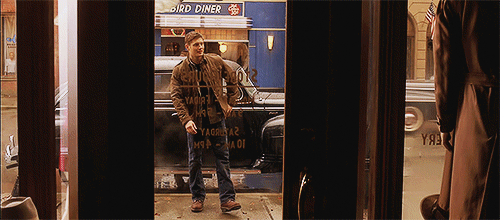
But also the whole episode centers around an immortal who dies because they were in love with a Human who couldn’t forgive them for lying...
Then from 8 onwards we have more Dean / Cas parallels with canon romantic couples: Jess/Sam, Mary/John, Cain/Colette, Don/Maggie, David/Violet, Dean/Cassie, Chronos/Lila, Cacao/Betsy, Jesse/Cesar, Jeffery/his demon, Sam/Amelia, Benny/Andrea, Prometheus/Hayley, Dean/Amara, Ishim/Lily, Gavin/Fiona, Corbin/Michelle...
Ok so this isn't a Destiel post, it’s a Dean is bi post, but you know, at this point they’re kind of interlinked, because Cas has a male body from season 9 onwards, that isn't his vessel, it’s him, so there you go, have that too.
10x01:
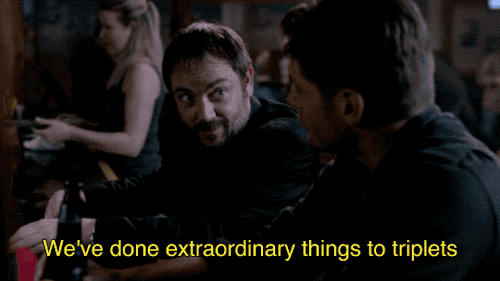
You mean THESE triplets? The only twins/triplets in the bar? Where the guy behind looks like he's the additional triplet by his placement and his outfit being the exact in between of the who playing? The ones who Crowley was seen talking to again in the same episode?

Either way, even if for some reason it wasn’t these particular triplets, cos you know, triplets are super common, it’s still heavily implied (and referred to again throughout seasons 10,11 and 12) that Dean had some kind of sex with triplets and Crowley, who “rubbed off all over him”...
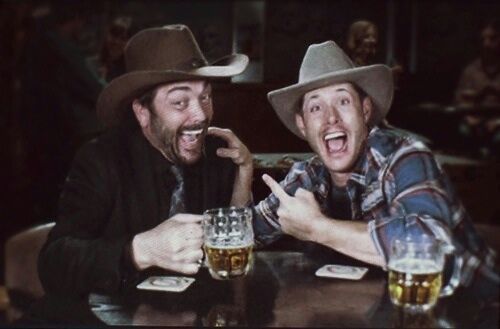
On top of that, sorry to be crude, but we also have these moments:
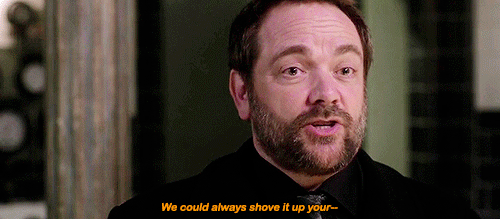
“...well, you could...” *insert Drowley meta here*.
and:

Then, back to the less crude side, 10x16:

So.... Dean is sick of hiding behind his facade? Do you think maybe it’s time someone came along and helped him see that he no longer needs to hide behind this wall? For a whole two seasons subtext be based around showing that Dean is in love with Cas and also kinda doesn't mind pop music for example, is actually not quite the dude bro he makes himself our to be and has a facade up that stops him from showing it?
Insert Amara. Whose name literally means Love. The expositional character of Dean’s innermost feelings, the extension of which is Mary, who ultimately leads to these feelings coming out after having been addressed for these two seasons...
Where an all knowing love - monster taking on her appearance tells him:
“I can see inside your heart. Feel the love you feel. Except...it’s cloaked in shame”.
Where in the SAME EPISODE Dean tells Sam that he doesn't feel love for Amara. So who can this possibly be referring to? For whom might he feel love cloaked in SHAME based on the last 10 years of what he have learned about Dean? Where only two episodes before Dean is told by a “wise woman” (who in film always sees truth) that he is pining for someone. PINING, a term interchangeable with LONGING. With whom do we associate LONGING?
I mean honestly... like we need an exposition for what this is all about...
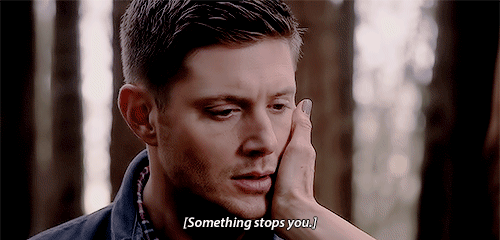
Meanwhile, if there were any issues with Dean feeling that Hunting and being queer are frowned upon they nicely insert an amazingly, fantastically, blatantly mirrored Dean/Jesse Cas/Cesar episode, even down to the brother focused story, the way Cesar and Dean click and interact so similarly to Dean/Cas and the shoulder patting being the most we actually see of them being romantic, I mean JEEZ:

And now if he needed to hammer it home even further:

I mean, I think he gets the picture... it’s nothing to be ashamed of now.
So now thanks to his own personal growth, all this and the extension of Amara, Mary, Dean has finally faced his past, his feelings and given his wall the metaphorical and literal heave - ho:
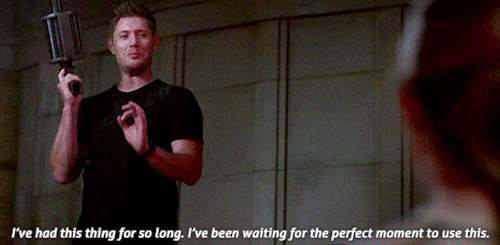
In conclusion:
1. Dean is bisexual. Dean has always been bisexual, he was closeted for so long, but after all this time and thanks to his being in love with one guy in particular and Mary’s role in his self awareness and self acceptance arc, now is more or less the perfect moment to come out...
2. Dean met and over time went from lusting after to being deeply in love with Cas, who is now male, it is HIS body and he identifies with it as such, who has inconveniently right after this moment of final clarity for Dean, died what seemed to Dean to be a true and permanent Death while he screamed ‘noooo’, fell to his knees in shock and nicely paralleled two of the most doomed - romance canon couples in the show within 5 minutes (Jess and Sam and Cain and Colette).
Both sides of this have come to a climax at the end of season 12, I believe leading to things really happening now moving forwards... So this, when it all comes to the forefront is NOT fan service.
It has been there all along, at first subtly, then growing, finally becoming core to the main plot of the character and plot based storylines until this point.
4K notes
·
View notes
Link
Leading up to their engagement, Michelle and Barack Obama had very different ideas of what marriage should be.
“He saw marriage as the loving alignment of two people who could lead parallel lives but without forgoing any independent dreams or ambitions,” Michelle Obama writes in her memoir Becoming, released on Tuesday. “For me, marriage was more like a full-on merger, a reconfiguring of two lives into one, with the well-being of a family taking precedence over any one agenda or goal.”
What they forged in the years that followed, Obama writes in Becoming, was a little bit of both: a marriage in which each supported the other, and each person sometimes made sacrifices for the other’s career.
It’s a high-profile version of what journalist Hanna Rosin has called the “seesaw marriage.” In such a marriage, she writes in her 2012 book The End of Men, “the division of earnings might be 40:60 or 80:20 — and a year or two later may flip, giving each partner a shot at satisfaction.”
Such marriages may be becoming more common. Couples are saying, “We’re no longer going to just assume that the man’s job has priority,” said Stephanie Coontz, a professor of history and family studies at the Evergreen State College. “I think that’s a sea change in marriages.”
The Obamas’ marriage reveals some of the strengths of seesaw marriages — both partners have been able to have fulfilling careers, and take risks, even while raising two children. At the same time, the setup has potential pitfalls: The partner who steps back to support the other’s career may not get the chance to step forward again. And because of the gendered nature of work and child care in America, the partner who gets short shrift in a heterosexual couple is often the woman.
Michelle Obama took a big step away from her career path when her husband became president, leaving her job at the University of Chicago Medical Center to become the first lady — a big job, certainly, but not one she necessarily would have chosen on her own. Now that the Obamas are no longer in the White House, it may be Michelle’s time to step forward again — and what both she and her husband do next could be a model for couples nationwide.
In Becoming, Michelle Obama writes that even before they were married, Barack inspired her to seek her true calling — and supported her when that meant taking a step in an uncertain direction. In her late 20s, when they were engaged, Obama was feeling dissatisfied with her career as a corporate lawyer. Valerie Jarrett, who would later become a senior adviser to President Obama, was then working for Mayor Richard M. Daley of Chicago, and she offered Michelle a job as assistant to the mayor.
The opportunity excited Michelle, but it would mean a career change and a significant pay cut at a time when the Obamas were thinking about starting a family. Her mother had taught her to play it safe: “Make the money first and worry about your happiness later” was her advice. Barack saw things differently.
“His was the lone voice telling me to just go for it, to erase the worries and go toward whatever I thought would make me happy,” Michelle writes. “Don’t worry, Barack was saying. You can do this. We’ll figure it out.”
She took the job. Soon after they were married, Obama made another job change, this time becoming executive director of Public Allies, an organization that trained future community leaders. Again, her husband encouraged her to make the leap, and he worked multiple jobs, in part to compensate for the pay cut she’d taken when she left the law.
Soon, however, it was her turn to support him. When he wanted to run for Illinois state Senate in 1996, she wasn’t sure it was a good idea. But, she writes, “he was the lone person who had waved me forward when I wanted to leave my law career,” and “in our six years together, he hadn’t once doubted my instincts or my capabilities.” She gave him her blessing, and he ran and won.
So began a political career for Barack Obama during which his wife would have to make many sacrifices — in an already much-cited passage in Becoming, she writes about giving herself the injections she needed for IVF while her husband was consumed by his job in the state legislature.
But when his family needed him, he was capable of saying no to politics — when their daughter Malia, then a toddler, got sick on a trip to Hawaii, Barack missed a crucial state Senate vote to stay with the family. Perhaps in part as a result, he lost his primary bid to represent Illinois’s First District in Congress in 2000 — after a brutal campaign in which, Michelle Obama writes, “it was almost as if every day he were forced to cast another vote, between family and politics, politics and family.”
Those kinds of choices are still more familiar to mothers than to fathers, who are expected to go all-in on their careers — but for her husband, Obama writes, family was always crucial, even when work was at its most intense.
Of course, it was Michelle Obama who ended up making some of the biggest sacrifices of their marriage. When her husband’s presidential campaign kicked into high gear after the 2008 Iowa caucus, she took a leave of absence from her job at the University of Chicago Medical Center, “knowing that it would be impossible, really, to stay on and be effective.”
“It had been painful,” she writes, “to step away from my work, but there was no choice: My family needed me, and that mattered more.” Obama became an active first lady, and made the role her own, based on what she’d already learned in a successful and varied career: “After all I’d done to lever myself out of corporate law and into more meaningful community-minded work, I knew I’d be happiest if I could engage actively and work toward achieving measurable results.”
Still, she hadn’t wanted her husband to run for office in the first place, and living in the White House wasn’t one of her goals when she agreed to marry Barack Obama. When he ran for president, the seesaw of their marriage tipped, out of necessity, toward him.
There’s not much data on seesaw marriages yet, Coontz said. But the pay gap in heterosexual marriages — the amount by which husbands, on average, out-earn their wives — is decreasing. And couples today, especially those on the younger side, are less and less likely to assume that the woman should be the one to sacrifice career for family.
“In most families, we don’t face the kind of jobs that require someone to completely quit when the other one is working,” Coontz noted. But for many couples, an egalitarian marriage can involve a certain amount of seesawing over time.
And that can be a good thing, she said. Research has found that when men in heterosexual marriages take parental leave, they boost their wives’ future earnings. Meanwhile, men who take parental leave also become more involved fathers, an effect that holds when they go back to work.
“I think you would see a similar thing in seesaw marriages,” Coontz said. When the seesaw tilts toward the wife’s career, men get “much more experience in hands-on partnership and parenting” — when it tilts toward the husband’s, the wife can still reap some of the benefits of her previous investment in work.
What’s more, having each partner play both caregiver and breadwinner roles “protects in the same way that financial investors tell you to diversify your portfolio” — if one person loses his or her job, the other is more prepared to pick up the slack.
But there is also a risk in seesaw marriages, Coontz said, that once the seesaw tilts toward one person’s career, it may never tilt back. “It’s a particular risk for women,” she said, because of discrimination against mothers in the workplace. But men bear some risk too, as fathers can also face discrimination in the workplace when they take time out to be with their kids.
Meanwhile, the option of a seesaw marriage isn’t available to everyone. Single parents frequently have to assume both breadwinner and primary caregiver roles at once. People whose spouses are ill or disabled may find themselves in one (or both) roles for long periods of time, with little choice in the matter. Same-sex couples may have seesaw marriages, but their decisions may be complicated by the sexuality pay gap and by anti-LGBTQ discrimination in the workplace.
For those who are willing and able to enter into seesaw marriages, better support systems for parents and families, including health care that’s not tied to employment, would help mitigate the risks. “We need the policies that allow people to move in and out” of caregiver and breadwinner roles, Coontz said.
Now that the Obamas are no longer in the White House, the seesaw may be swinging back in Michelle Obama’s direction.
“I am now at a new beginning, in a new phase of life,” Obama writes in the epilogue of Becoming. “For the first time in many years, I’m unhooked from any obligation as a political spouse, unencumbered by other people’s expectations.”
It’s not clear what she’ll do with her new freedom — she states categorically that she has “no intention of running for office, ever.”
But, she writes, “at fifty-four, I am still in progress, and I hope that I always will be.”
According to Becoming, both the Obamas have been “in progress” throughout their marriage. They have supported each other’s goals through risks and difficult times, in the interests of living by President Obama’s maxim: “You can do this.”
When Barack Obama became president, Michelle’s progress took a turn that she didn’t see coming when she met him at their law firm many years ago. Now it may be his role to support her through turns he can’t anticipate. If he does, the Obamas will continue to do what they’ve long been doing — modeling a marriage that, while not always perfect, allows each partner the freedom to grow and change while remaining committed to the family.
“What did Barack and I want?” Obama writes of the time before their marriage. “We wanted a modern partnership that suited us both.”
The work of forging that partnership, year by year, in ways that serve and nourish both partners and their family as a whole, will go down as part of their legacy.
Original Source -> Michelle Obama left her job so her husband could be president. Now it’s her turn to shine.
via The Conservative Brief
0 notes